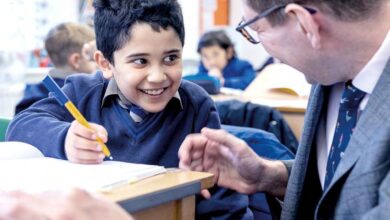Empowering the Future: Developing Skills for Middle-Grades Education

Middle-grade education is a pivotal phase in a young person’s academic journey, establishing critical foundations during a uniquely transformative period. During these years, students transition from the more sheltered environments of elementary schools to the broader horizons of high school, defining their future educational trajectories. Within this transitional period, they start to develop a deeper understanding of themselves and the world around them, navigating the complexities of adolescence. It makes the role of educators especially crucial, as acquiring a middle level education degree equips them with the expertise needed to guide students effectively during these formative years. Teachers at this level are entrusted with more than simply imparting academic knowledge. They must also help students grapple with the rapid intellectual, emotional, and social changes they experience during adolescence. This dual focus on academics and personal development positions middle-grades education as a vital period that influences students’ attitudes towards learning and their self-perception for years to come. The strategies employed during these years have the power to shape their lifelong learning journeys and personal development.
Key Skills for Success in Middle-Grades Education
Developing essential skills in students is paramount to ensuring their success now and in the future. Skills such as critical thinking prove indispensable, as they enable students to evaluate information, identify biases, and make reasoned conclusions. This capability is foundational in both academic and real-world scenarios. Critical thinking allows students to approach problems systematically and creatively, fostering an intellectual resilience indispensable in the modern world. Moreover, communication is crucial to a student’s growing ability to articulate ideas and collaborate effectively with peers. These abilities establish the foundation of effective personal interactions and are integral to group dynamics in both academic and professional settings. As students advance through their educational journeys, communicating clearly and working well with others becomes increasingly important. Additionally, adaptability and resilience are crucial; as students navigate changing dynamics and challenges, these traits empower them to manage stress and overcome obstacles confidently.
Innovative Teaching Methods
The landscape of classroom teaching has evolved significantly over the past decade, driven by the need to address diverse learning styles and engage students more effectively amidst rapidly changing educational expectations. Project-based learning engages students with practical issues, connecting theoretical understanding and real-world implementation. This method enhances problem-solving and analytical skills and makes learning more relevant and impactful by allowing students to see the value of their academic pursuits beyond the classroom. In addition, the flipped classroom model is an innovation that has gained traction among educators. By exposing students to new material outside of class through videos or readings, teachers can use classroom hours for engaging discussions and practical exercises that reinforce understanding. This model is beneficial as it caters to various learning paces and styles, ensuring no student is left behind. It also allows for more individualized attention during class, where teachers can address specific student needs and delve deeper into complex topics.
The Role of Technology in Middle-Grades Education
Technology’s integration into education has been nothing short of transformative, offering many opportunities for enriching the learning experience. Through digital tools and resources, educators can present material in interactive formats that capture students’ attention and foster engagement. Tools like smart boards, educational apps, and online resources provide students with immersive and personalized learning experiences, making education more engaging. Technology also enhances interaction and teamwork between students and educators, creating a more connected and interactive classroom environment. Virtual classrooms, discussion boards, and shared resources make collaborating on projects and accessing information easier. By embracing technology, educators can tailor their instructional strategies to meet the individual needs of their students and maximize their learning potential. When used effectively, technology is an enabler of achievement and an integrator of multidisciplinary approaches.
Parental and Community Involvement
The engagement of parents and the community is vital to enhancing students’ educational experience. Research highlights the positive impact of parental engagement on a child’s academic performance and social development. Schools that cultivate strong partnerships with families create a supportive environment beyond the classroom, providing a network of support and encouragement vital for student success. Parents and community members can contribute in numerous ways, such as volunteering in classrooms, participating in school events, or offering mentoring programs. These interactions help bridge the gap between home and school, reinforcing a consistent message and creating a stable framework for educational growth. By fostering these connections and encouraging open communication, schools empower students to flourish academically and personally and reinforce the values necessary for becoming responsible and conscientious members of society.
Adopting a Growth Mindset
Adopting a growth mindset—where effort and perseverance are valued over innate ability—can be transformative for educators and students. Carol Dweck’s influential work underscores how individuals who believe in their capacity to grow through effort are more resilient and prosperous. This mindset nurtures a passion for learning, motivating students to see obstacles as chances for development rather than obstacles to be avoided. Educators play a key role in promoting this mindset by incorporating strategies that encourage reflection and celebrating effort rather than merely achievement. By adopting a growth mindset, students cultivate the resilience to tackle obstacles head-on and learn from their mistakes, leading to a lifelong love of learning and the courage to take on new challenges. Through cultivating this mindset, educators are equipping students with one of the most essential skills for future success—the belief in their capacity to learn and grow consistently throughout their lives.
Challenges and Solutions in Middle-Grades Education
Middle-grade education is not without its challenges. Educators often face curriculum demands that can seem overwhelming and resource limitations that can impact their ability to deliver effective instruction. Despite these challenges, education professionals are known for their adaptability and resourcefulness. They can develop strategic approaches to navigate these obstacles, ensuring they provide the best possible education for their students. Professional growth is essential for providing educators with the most current teaching methods and resources. Through ongoing learning, educators remain informed about educational trends and innovations, allowing them to modify their teaching approaches to accommodate the changing needs of their students. Leveraging community resources and partnerships can also provide additional support, enhancing the learning environment for all students. This holistic approach ensures that all stakeholders actively contribute to overcoming challenges and enhancing student outcomes, paving the way for holistic, inclusive education.
Conclusion: Shaping Tomorrow’s Leaders
In conclusion, middle-grade education is a cornerstone in developing the skills and knowledge necessary for future success. As we empower the younger generation with the capabilities they need to navigate the complexities of the modern world, educators, parents, and communities must work hand-in-hand. Together, they can create an enriching environment that promotes growth, encourages curiosity, and shapes students into adaptive, thoughtful leaders ready to contribute meaningfully to society. By fostering an environment that prioritizes learning, engagement, and support, we not only equip students with the tools necessary for academic success but also nurture individuals capable of leadership, innovation, and empathy in their respective fields. Middle-grade education is fundamental in nurturing a brighter, more promising future for all.




